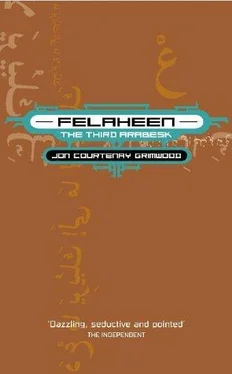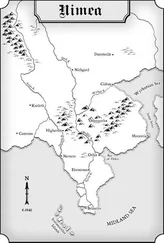"Can I get you anything?" Isabeau asked when Eduardo reached the door she'd left open.
"Water," he said. And then said nothing for a whole five minutes.
On the street below, workmen were busy stringing green-and-red bunting from one lamppost to another and adjusting crowd barriers under the bored gaze of traffic policemen. One of the many street parties would be held there. Enthusiasm fuelled by Ashraf Pasha's announcement that all the food would be free. Bread and circuses . Eduardo was still trying to work out exactly when His Excellency meant.
"You own this?"
"I rent it from the city," Isabeau said. "My brother also used to live here."
"You have a bedroom?"
"Obviously."
"Show me," Eduardo said.
The sex was perfunctory, almost matter-of-fact. And Eduardo thanked her when it was done. Not daring to show her contempt, Isabeau shrugged, sat up from where she'd been tipped backwards onto her bed and adjusted her denim skirt, smoothing it down over her legs and his smell. She'd known what was coming. Expected it.
For his part, he hadn't bothered to use a condom or remove her shoes.
"Now what?" Isabeau asked.
"We talk . . ." Zipping his fly, Eduardo reached for his notebook and tapped it to make it open. "I know you killed Pascal. That's not the issue."
Eduardo paused, giving the girl an opportunity to deny it but she just looked at him.
"You want to tell me why it happened?"
Isabeau shook her head. "You don't want to know."
"But the others knew? The rest of your group . . . ?"
She spread her hands, neither denying nor agreeing.
"And so when you killed Pascal they covered for you," Eduardo said. "In itself, that is significant. The way I see it." He was proud of that phrase. "You stabbed your brother in the kitchen and had someone help you drag his body up to the alley . . . All those clean stairs," Eduardo explained. "But first you swapped knives. Probably put your own through the industrial washer."
Isabeau smiled.
"So what did you do with the real one?"
"There was no real knife," said Isabeau. "And he died in the corridor outside the chill room. The stab wounds came later. Someone else did those."
"So how did you kill him?"
"With a leg of lamb," she said flatly.
Eduardo looked at her.
"It was frozen."
"Ah . . ." Eduardo thought about the coroner's report. A perfunctory half page with a throwaway line noting the victim had obviously smashed his skull on the cobbles of the alley when falling. "And what happened to the leg of lamb?" asked Eduardo.
"We ate it. One night when a shift was finished. Me, the others, even that Egyptian waiter, the one who looked so very much like . . ."
Eduardo held up his hand, consulted his notebook. "I believe the waiter's dead," he said.
Isabeau nodded. "A bit like my brother."
As she waited for her turbani at Gare de Tunis, the first Fez–Iskandryia express to stop there in thirty years and a sign of the West's sudden faith in the new regime, Isabeau told herself to be realistic. Everything in life had a price, including freedom. And if two perfunctory bouts of unwilling sex with a stranger were it, then there were worse ways to stay out of jail. As well as worse people to have such sex with, much worse.
When he was done questioning, Eduardo had tipped Isabeau onto her back again, pushed up her skirt until it reached her hips and, almost apologetically, grabbed the sides of her new knickers and pulled those down. Unzipping, he'd given himself a few jerks to strengthen his resolve and pushed into her, the toes of his shoes sliding on the tiles . . .
"I'm pregnant," Isabeau said, her words enough to startle Eduardo into stopping midstroke. "Did you know that?"
For a second he almost shook his head but the temptation to be seen to know everything was too great, so he nodded instead. All the same, he retreated to the edge of her bed and tucked himself inside his trousers. A manoeuvre made simple by the fact he never wore underwear. Too much extra washing.
"What do you intend to do about it?"
"About what?"
"The baby?"
"I don't know," Isabeau said, bending forward to retrieve her knickers. "What do you suggest?"
"I suggest a holiday." Dipping his hand inside his coat, Eduardo produced an envelope. "I was going to give you this when I went," he said, looking shamefaced. It contained a fat and tattered wad of Ottoman dollars. Almost no one used Ottoman dollars anymore, except in the suqs and most of those could manage credit cards. Only the very old still insisted on keeping their lives in boxes under the bed.
"Call it severance pay from Maison Hafsid."
At least they were high-denomination notes. Higher than Isabeau had seen before and in one case higher than she knew existed. To this man though, used as he must be to such things, they were probably small change.
"And this," said Eduardo, "is also for you." As the exchange rate stood, the second, far smaller wad of US dollars was worth about twice all the other notes put together. On the black market the dollars were worth maybe five times that.
"You want me to leave," said Isabeau. Although it wasn't until later that she realized she was only putting into words what she already knew.
"Wait, Madame DuPuis . . . You have to wait."
A railway porter glanced round and saw a young police lieutenant in brand-new uniform stride towards a woman about to clamber through the door of a second-class carriage. Alexandre scowled at the porter and the elderly man decided he had business elsewhere.
"Madame Isabeau?"
Isabeau nodded. No one had ever called her madame before. And DuPuis definitely wasn't her surname.
"These are for you," Alexandre said as he handed her an envelope. "The Chief told me to deliver them." Jagged as a tidal pull between rocks, an undercurrent to the young man's politeness suggested he was less than happy to be hand-delivering notes on the morning the old Emir was buried.
"Thank you." Isabeau flashed her sweetest smile and watched Alexandre melt. It wasn't their surliness or even the fact they often seemed to smell that put Isabeau off men, it was the fact they could be so childish, so unbelievably easily led.
"Oh," said Alexandre, "and I'm sorry . . ."
Isabeau raised her eyebrows.
"About . . ." He shuffled his feet, apparently unable to get beyond that word. "About your husband. It was a messy campaign. A just one, obviously, but messy and I'm glad it's over." He clicked his heels and gave her a salute, the smartness of which was utterly at odds with the state of his fingernails, which were bitten to the quick.
Once sitting, with her case pushed into the space behind her seat and a capuchin from a cart that had passed by on the platform outside, Isabeau ripped the flap on her new envelope, then glanced round. The carriage was almost empty despite this being the first turbani de luxe to run for years. Outside, the concourse was crowded, but with people arriving, not departing. Nasrani tourists, Nefzaoua up from Kibili to visit recently remembered family, farmers from the High Tell, pickpockets. Few wanted to leave a city when so much was about to happen.
Twenty-four hours of mourning for the old Emir, then seven days of celebration for the new. Isabeau supposed that made sense if she didn't think about it too hard.
Shaking out her envelope's contents, she saw two rings slide out and clatter across the table, along with something on a dull-metal chain. The small, official-looking booklet which followed landed without a sound and Isabeau wouldn't have known the envelope contained a letter of condolence if habit hadn't made her check inside.
It seemed her husband had died in a police operation, somewhere unspecified, south of Garaa Tebourt while rescuing his superior officer. Isabeau liked that touch. As if any man she married wouldn't frag all the officers and NCOs first opportunity he got, then head off down some wadi for Tripolitana. As if she'd marry any man . . .
Читать дальше












